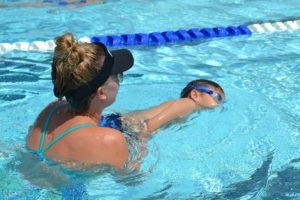 As parents enroll their children in swim lessons, it’s natural for them to have questions. One of the common questions we hear is “how long will it take for my child to learn how to swim?” While a simple answer would be welcomed, it simply couldn’t be accurate.
As parents enroll their children in swim lessons, it’s natural for them to have questions. One of the common questions we hear is “how long will it take for my child to learn how to swim?” While a simple answer would be welcomed, it simply couldn’t be accurate.
Just like learning to read, children learn new skills at their own pace. There are many factors that can lead to a longer learning period, such as overcoming fears or a shorter attention span. What is essential is that parents encourage children to continue to set reasonable goals and foster a fun learning environment.
Here is a breakdown of the seven general factors that play into a child’s learning pace.
Chronological Age – In the most general assessments, children of a similar chronological age often have achieved similar milestones in their development. However, that does not mean that they have the same skills. Especially when a child is learning a detailed skill, such as swimming, many other factors play into their actual abilities.
Motor Skill Development – At the base level, some people are more coordinated than others, and that will always be the case. If you were to dive deeper into the discussion, some children’s motor skills simply take longer to develop than others; it doesn’t mean they won’t be fully coordinated adults. If you feel as though your child’s motor skill development is far behind schedule, it may be best to consult your pediatrician.
Emotional Development – Learning to swim is a full person experience. A child’s emotional development can launch them towards success or hold them back. It is normal for children to be nervous or fearful when learning to swim. It is also an opportunity for parents to help their child overcome the anxiety of learning a new skill and bolster his or her emotional development.
Cognitive Development – While many adults see swimming as a single task, learning to swim requires the ability to take very specific instructions, interpret them, and put them together into movements. It’s very complicated, especially for young children. However, swim lessons can actually help your child’s cognitive development.
Physical Development – In addition to cognitive skills, learning to swim also requires strength and coordination. As children grow, their bodies become stronger, and they learn how to better control their movement. Exposing children to activities, such as swim lessons, can help enhance their physical development.
Practice Time with A Well-Trained Instructor – Well-trained instructors know how to work with children and progressively build upon skills in a structured setting. The more time a child has with a well-trained instructor, the more likely he or she is to learn at a faster pace. While learning with parents and older siblings can be effective, it doesn’t necessarily have the same efficiency as learning in a structured swim program.
Unstructured Swim Time – While structured swim lessons will help a child learn at a faster pace, unstructured swim time is just as important for the learning process. Children need to have time to experiment with their new skills and the movement of their bodies on their own. Play is an essential part of learning to swim.
Swim Lessons With Premier
Premier Aquatic Services swim instructors use an exciting approach to help swimmers of all ages learn the skills necessary for a lifetime of swimming enjoyment. Our certified swim instructors are experienced with teaching all levels, and they are able to help parents differentiate between a child’s normal progression and signs of developmental issues that should be watched.
To learn more about our swim lesson programs and register family for summer swim classes, visit our aquatic services page.
For more information on water safety, follow us on Facebook.